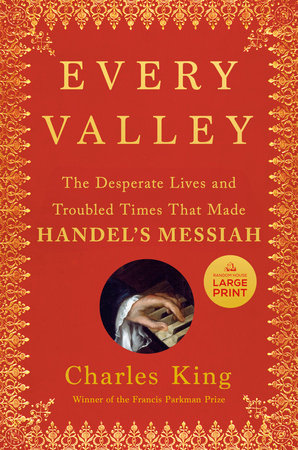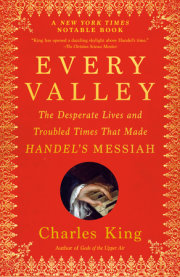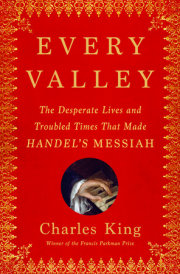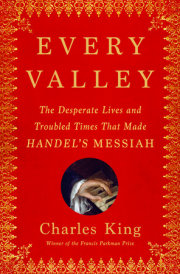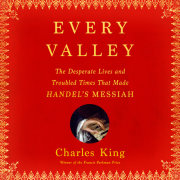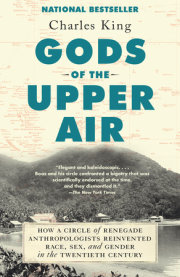“The Famous Mr. Hendel”
London, 1717
The Thames was tiled with boats late on a midsummer Wednesday, the kind of liquid English evening where twilight seems to last forever. His Most Sacred Majesty George I, three years into his reign, had set out in a gilded barge around eight o’clock. River craft brimming with duchesses, earls, and other “Persons of Quality,” as one witness put it, now jostled for position near him on the water. On another ceremonial barge, fifty violinists, trumpeters, and other musicians cycled through minuets, airs, and hornpipes.
Surrounding the courtiers in silk gowns and powdered wigs, commoners paddled along in their own rowboats and skiffs, laughing and hurling creative insults at each other across the water. “You pimps to your own mothers, stallions to your sisters, . . . christened out of a chamber pot, how dare you show your ugly faces upon the river of Thames, and fright the king’s swans?” rowers and wherrymen were known to cry. “You offspring of a dunghill, and brothers to a pumpkin . . . hold your tongues . . . or I’ll whet my needle upon mine arse and sew your lips together,” might come the reply.
As the raucous procession passed by, onlookers gawked and chittered on dry land. The people, reported a Swiss observer, were “sans nombre.” Every now and then, a cheer might ripple through the ranks, starting beyond earshot and rolling closer, like a rainstorm combing through a clump of willows.
To any newcomer in the crowd, nature itself seemed to bend to the king’s will. From Whitehall to Westminster, past Lambeth and the pleasure gardens at Vauxhall, the slow-moving current was drawing the boats, astonishingly, upriver. A child on the embankment could have challenged the sovereign to a race and won—by running in what would have been, on any ordinary day, the wrong direction.
The entire affair, it turned out, had been planned on a waterman’s secret.
Travelers coming to London by sea were sometimes surprised when their sailing ships anchored at the mouth of the Thames and then simply waited—not for a shift in the wind but for a change in the water. Depending on the hour, the river flowed either forward or backward, pushed along by the estuarial tide, carrying lost boots, schools of pike and carp, occasionally corpses, and just now royals and nobility headed toward supper and an evening’s entertainment at a garden villa upstream in Chelsea. Early the next morning, with the water returned to its normal state, George floated back home and allowed everyone finally to retire to bed.
Two days later, when a newspaper gave an account of the outing, the most remarkable thing was reckoned to be not the king and his mobile court, swept along by a reversible river, but rather “the finest Symphonies, compos’d express for this Occasion,” and the German who had written them. He was thirty-two years old, graced with a royal pension, and comfortable in four languages. He was said to have survived a sword thrust when an opponent’s blade landed on a button. He had attached himself to dukes who became princes and princes who became kings. It would take the better part of a century for other people to rearrange his latest work, composed in bright major keys built for the outdoors, and drag it into a concert hall. Its title, Water Music, would forever carry a whiff of cow parsley and river mud. But chroniclers were already calling him “the famous Mr. Hendel,” and on this splendid July evening, a few months into his thirty-third year, he had every reason to believe one obvious thing: the right river, taken at the flood, could work miracles.
George Frideric Handel—one of the ways he would eventually spell his name—was a native of Halle in Saxony, part of the mosaic of central European kingdoms, principalities, duchies, and free cities that formed the Holy Roman Empire. He was born in February 1685, in the long shadow of conflicts over religion and territory later called the Thirty Years’ War. The war had begun with an event that history students would remember for its comical name: the defenestration of Prague, in 1618, when local Protestants showed their contempt for the emperor’s Catholic representatives by tossing them from a castle window. Disagreements over political and religious authority exploded into military crises. Other powers, from Sweden to the Ottoman Empire, lined up to defend allies or take advantage of disorder.
What followed was a misery of pitched battles, guerrilla raids, failed harvests, and waves of typhus and plague. The Protestant city of Magdeburg, north of Halle on the Elbe River, was leveled by house-to-house arson. A soldier along the Rhine reported that towns had “neither cat nor dog,” since villagers had eaten them all. In Bavaria wolves stalked humans in packs. Across the German lands, mayors ordered the burning of women who were blamed for witching the world into such calamity. Some parts of Europe lost perhaps 20 percent of their populations, a multiple of the casualty rates during the twentieth century’s two world wars. In all, as many as eight million people might have died as a result of combat or its consequences. The Peace of Westphalia, which ended the conflict in 1648, promised a war-free future that would be “Christian, general, and permanent.” Religious disputes among Catholics, Calvinists, and Lutherans were, in theory, relegated to matters of communal organization and conscience, not pretexts for violence.
Handel’s father, Georg Händel, the son of a coppersmith, had grown up amid Europe’s forever war. With displaced villagers clogging the roads and cities besieged by foreign mercenaries, he made a living by assuaging human pain. His income came from retainers he was paid as a physician to aristocratic families—their official barber-surgeon, in the language of the day—supplemented by earnings as a pub keeper and public health official. During the era’s frequent epidemics, his job was to cordon off neighborhoods and minister to doomed patients. One of them was his own wife, who succumbed to the plague. Georg soon remarried, to a widow and mother some thirty years his junior, Dorothea Taust, the daughter of a Lutheran minister. One of the children they had together, the first to survive infancy, was George Frideric.
The new household was complicated and multigenerational, with crisscrossing relationships that made Dorothea something close to her own great-aunt, when one of her siblings married one of her step-grandchildren. Amid this swirl George Frideric might have been expected to follow his father into the healing business or perhaps advance into a profession such as the law. His interests, however, ran in a different direction.
Even in a provincial city such as Halle, music was everywhere: in the liturgy of the Gothic Marktkirche, the Protestant church where his parents had George Frideric baptized; in the celebrated boys’ choir of a local orphanage; in the courtly calendar of the Duke of Saxe-Weissenfels, the local landowner; and in the popular songs that accompanied flagons of wine passed around in the Yellow Stag, Georg’s establishment in the town center. Once Georg and Dorothea gave their son an opportunity to pluck a violin string or press down on an organ key, the sound coming at once from nowhere and everywhere, the feeling must have been electric. He was the kind of child for whom fiddling with an instrument was less a parental requirement than a personal fixation. In later life he would apparently say that as a boy he had hidden a clavichord, a small keyboard, in the attic so he could practice without disturbing the family. The story was dubious, given that no one plays an instrument inside a house in secret, but telling in its specificity, like an adult recalling the childhood thrill of reading a favorite book past bedtime.
The boy’s ability was immediately recognizable to people who met him. But the world was full of talent. Johann Ambrosius Bach’s son Johann Sebastian had been born a few weeks after George Frideric in Eisenach, a two-day coach ride away. The young Johann, however, was reared in a family of established violinists and organists, not bloodletters and pastors. (The two would remain in separate worlds; even in later life, they never met.) For his part, George Frideric’s father seems to have had doubts about his son’s enthusiasms. At first he practically swatted the boy’s fingers away from the keys whenever he had a chance. Yet Georg would have understood that, whatever the line of work, making a living depended on training and patronage. Both were as essential to barber-surgeons as to musicians.
Georg eventually arranged for his son to receive lessons in organ, violin, and composition from Friedrich Wilhelm Zachow, the organist in the Marktkirche, which towered over Halle’s market square, a short walk away from the family home. George Frideric slid into an apprenticeship not unlike the ones his father and grandfather would have known: watching a master, learning by doing, copying the best examples of the craft. Over the next several years as Zachow’s pupil, he filled up notebooks with musical figures and phrases. He puzzled through which arrangement of sounds produced a particular effect and which ones were amateurish or, by convention, simply wrong. To discover why a composition worked from the inside, you had to touch the welds and pieces, to feel how the seams separated perfection from disaster. He would keep some of these early exercises and sketches into adulthood.
When George Frideric was eleven, his father died suddenly. The household Georg left behind, now headed by a double widow, was dependent on frugality and the kindness of relations. Insuring against an uncertain future seemed a wise course. A few years later, the young Handel began attending lectures at the local university, with no particular specialization in mind, while also taking a position as an organist in Halle’s cathedral, the Domkirche. According to his appointment letter, he was required to be present for services before the last peal of the church bells, keep the organ in good repair, mind the elders, and live “Ein christliches und erbauliches Leben,” a Christian and upstanding life. Instead, he chose to leave.
After a year at the cathedral, Handel moved to Hamburg, a dynamic free port on the Elbe. Over the previous century and a half, foreign arrivals—Sephardic Jews, French Huguenots, Dutch Protestants—had swelled the city’s entrepreneurial class and expanded its commercial networks. Ships arrived from the Baltic Sea, the Mediterranean, and beyond, laden with raisins, sugar, tobacco, salt, and iron. Hamburg’s guilds fiercely guarded their autonomy in the wider empire, and in the decades since the Thirty Years’ War they had turned their wealth toward urban renewal. A planned city with grid-like streets and new civic buildings grew up beyond the old town’s medieval battlements.
With the patronage of its mercantile core, Hamburg’s community of artists surpassed anything Handel had known in Halle. The city’s opera house, which opened in the 1670s, was the largest theater in northern Europe. According to Johann Mattheson, a young composer and musician who knew him there, Handel started off playing “a ripieno violin in the opera orchestra”—meaning part of the violin section rather than a soloist—“and behaved as if he could not count five; being naturally inclined to dry humour.” He occasionally traded lessons for meals and, after a while, began to write his own music.
Among Hamburg’s musicians, young men of quick talent and quicker tempers, barely into their twenties, rivalries could be as intense as friendships. After one performance, Handel and Mattheson reportedly took up swords to settle a dispute over command of the harpsichord. Mattheson’s rapier landed on a large metal button on Handel’s coat (or in another version of the story, a rolled-up score, which is too perfect to be believed). Mattheson would later boast that he had saved Handel’s life with his poor swordsmanship.
Hamburg’s instrumentalists and sometime composers played where required, in churches or private homes, traveling when necessary, making do. To get to a performance in another town, a musician might squeeze inside a crowded coach next to a pigeon seller and his birds. If no one was available to pump the bellows on a church organ, he could pull in the pastry maker’s son down the way. Handel was beginning to settle into a fraternity of itinerant, provincial performers, surviving on wits and whim, with no grand plan for what came next. His prospects began to change, however, when he met a visitor bearing the storied name of de’ Medici.
Copyright © 2024 by Charles King. All rights reserved. No part of this excerpt may be reproduced or reprinted without permission in writing from the publisher.

